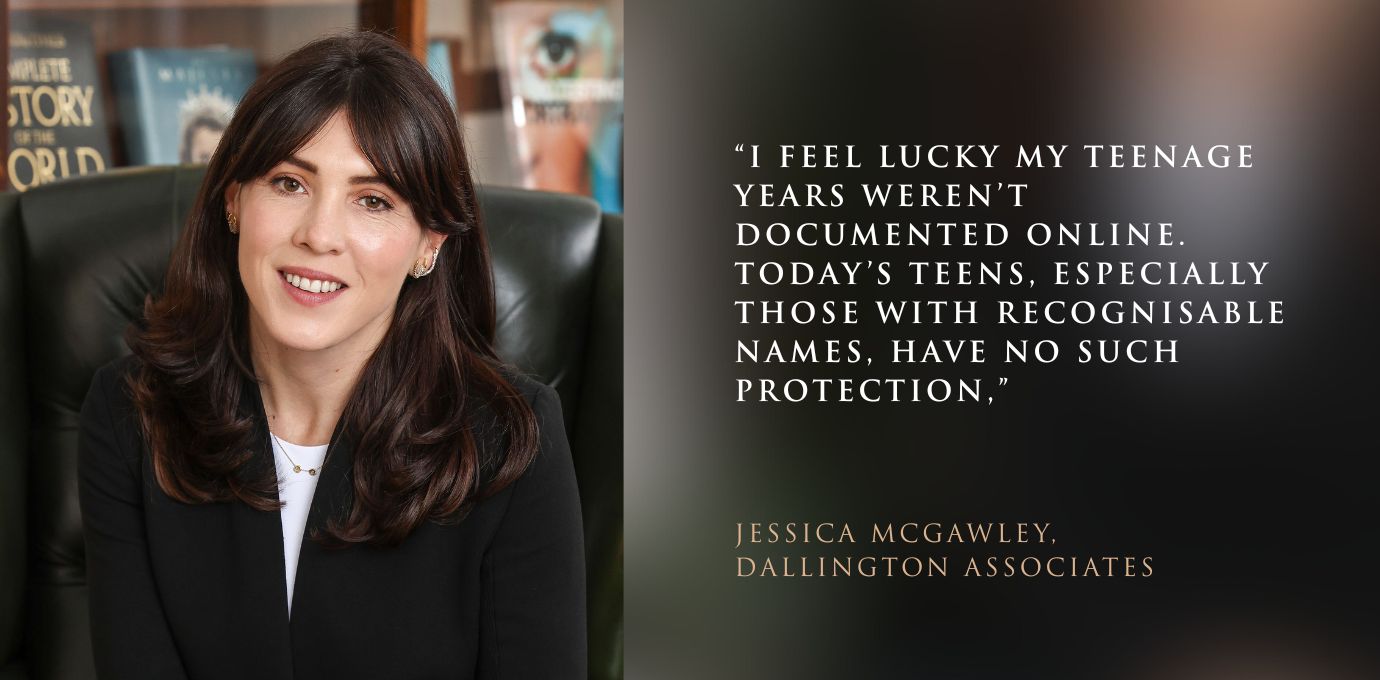How can we prepare UHNW or celebrity children for adulthood when their name, wealth or status puts them under extra pressure?
This is the third in a three-part series based on our conversation with psychological consultant Jessica McGawley, founder of Dallington Associates. Each piece explores how families of exceptional wealth can raise emotionally and practically grounded young adults, and how full-time private tutors support that journey.
For many ultra-high-net-worth families, parenting is bittersweet. You’ve built a life of extraordinary possibility for your children, and you did it by making sacrifices. Long hours, global travel and high-stakes decisions. Your success became their starting point. When they were small, you were building. Now they’re older, you want to shape, reconnect and influence them. But often they’re already pulling away.
Jessica McGawley is a qualified psychological consultant and mediator, and founder of Dallington Associates, a specialist mentorship practice designed specifically for the children of prominent families. Her team works with clients aged 16–28 across the world, helping them navigate the complex journey into adulthood with clarity, confidence, and self-awareness.
The Dallington approach blends mentoring, in-house psychotherapy, educational consultancy, family mediation, and practical life skills. Like Tutors International, they meet clients where they are and walk with them toward who they want to become.
When guilt erodes boundaries
One of the most common challenges we see in parenting teenagers is an absence of boundaries. Not because parents don’t care, but precisely because they do!
“These ultra-high-net-worth parents were building businesses when their kids were small. Maybe they weren’t around much during the toddler years. By the time the child is a teenager, a parent wants to make up for it, and that’s often by being lenient, financially, emotionally, and socially. They overcompensate. But a teenager doesn’t need a friend,” says Jessica. “They need emotional safety – and that comes from clear, consistent boundaries.”
Tutors modelling calm boundaries
At Tutors International, this is something we’re acutely aware of and have extensive experience of. A tutor isn’t a parent, a therapist, or a best friend. But we often become a reliable adult presence in a child’s life, particularly when families are under pressure, navigating transitions, or simply juggling too much at once.
“Tutors are in a unique position to model what a healthy professional boundary looks like,” says Jessica. “That means sessions start and end on time. Expectations are clear. If you’re guiding the student, you’re not doing the work for them – and that structure mirrors the working world.”
For many families, this is why full-time private tutoring becomes not just an educational choice, but a relational one. Discover why families choose full-time placements with Tutors International.
Structured conversations: a tool for emotional safety
One of the simplest, most effective frameworks Jessica teaches is how to have a structured conversation, especially when tensions run high.
“Some would call them ‘difficult conversations,’ but that puts people off. It’s a skill. And like any skill, it can be learned.”
Here’s her five-part framework for calmly addressing an issue with your child:
- Start with your tone.
Before you say anything, check in with yourself. Are you calm? Grounded? Open?
The tone you bring in the first 10 seconds often shapes the whole conversation.
Try beginning gently: “Can we chat for a minute? I just want to understand / talk about something.” - Name the fact.
Gently state what you’ve observed, without accusation.
“I see you’ve been on the PlayStation for four hours, is that right?” - Share how it feels.
Use “I” language to express your emotional experience.
“When that happens, I feel disconnected from you.” - Set the boundary.
Be clear, kind, and consistent, it helps create emotional safety.
“I’m happy for you to play after homework, between 4 and 6, but not during family time.” - Explain the impact.
Help them understand the why. It reframes limits as care.
“That way, you get your downtime, and we also get our family time. Are we on the same page?”
This teaches your child to pause and reflect rather than escalate.
Tutors as emotional mirrors
Tutors International tutors aren’t there to fix family dynamics but they can often reflect something important. When a student lashes out, or shrinks and disengages a great tutor doesn’t immediately correct or cajole. They observe, and give it space, and check back in later.
They might say:
“You seemed really frustrated earlier. Do you want to talk about that assignment again?”
Or:
“I noticed you weren’t yourself today. Want to just go for a walk?”
This is relational intelligence, and it builds trust over time.
One family’s turning point
Jessica recalls a family who began holding structured “quarterly family meetings”. They weren’t long or formal, but they did create space.
“You sit down and treat it like a proper meeting. What’s going on in your life right now? In the business? With the family? You bring those realities into the conversation – age-appropriately – so the children start to understand the moving parts and the struggles and the cost.”
There’s often an emotional cost to building and maintaining wealth at that level – a cost that’s rarely spoken about, but often deeply felt within the family. But with the quarterly meetings the family dynamic shifted. The children felt seen and for the first time, started to glimpse the whole picture of their lives.
When your name walks into the room before you do
One of the subtler, but deeply impactful, psychological costs of growing up in a prominent family is the lack of anonymity. This is a recurring theme when working with UHNW teenagers, who often find themselves recognised and judged before they’ve even had a chance to define who they are.
Most young people will make poor choices at some stage. That’s a normal and necessary part of development. But when your surname attracts media attention, or simply social fascination, even minor missteps can be blown out of proportion. What would be a quiet learning moment for one teenager can become a public spectacle for another, captured on social media or, in some cases, covered in the press.
“We’ve seen situations where the scrutiny doesn’t just come from the outside world,” Jessica says. “Sometimes it’s within the family network – a relative, adviser, or family friend who feeds information back. It creates this low-level paranoia and self-consciousness, which can be really damaging developmentally.”
Then there’s the expectation that children will mirror their high-achieving parents, especially if one or both are well-known entrepreneurs, investors or philanthropists.
“I hear this all the time: ‘Your father’s a genius at XYZ, so of course you will be too.’ But that’s not fair. That’s someone else’s story. You have to let young people tell you who they are, not decide it for them. It’s not about living up to someone else’s version of success - it’s about helping them find what their best looks like.”
It’s not always the parent applying this pressure. It’s often societal – coming from peers, teachers, or even just assumptions that follow the family name. “I feel lucky my teenage years weren’t documented online. Today’s teens, especially those with recognisable names, have no such protection,” says Jessica.

These teenagers can feel as though they are constantly being pre-interpreted, as though they’re stepping into a room where an identity has already been written for them.
This is one of the reasons why trusted adults outside the family system matter so much, especially those who offer neutrality and discretion. At Tutors International, our tutors are chosen not only for their academic expertise, but for their ability to foster independence — even (and especially) when that means letting students stumble before they succeed. Read more about how our tutors equip students for independent learning.
For many young people, the tutor becomes the one adult who meets them without preconception. They are outside the family structure, free from legacy expectations, and trained to see the individual rather than the inheritance. That neutrality, combined with our reputation for excellence and the longstanding trust our clients place in us, creates the conditions for something rare: a relationship built on authenticity, not assumption.
A strength-based approach is central to our work with UHNW families. When a student can be met as an individual, and not as an extension of a reputation, it offers something rare and deeply valuable: space to grow into their own identity.

